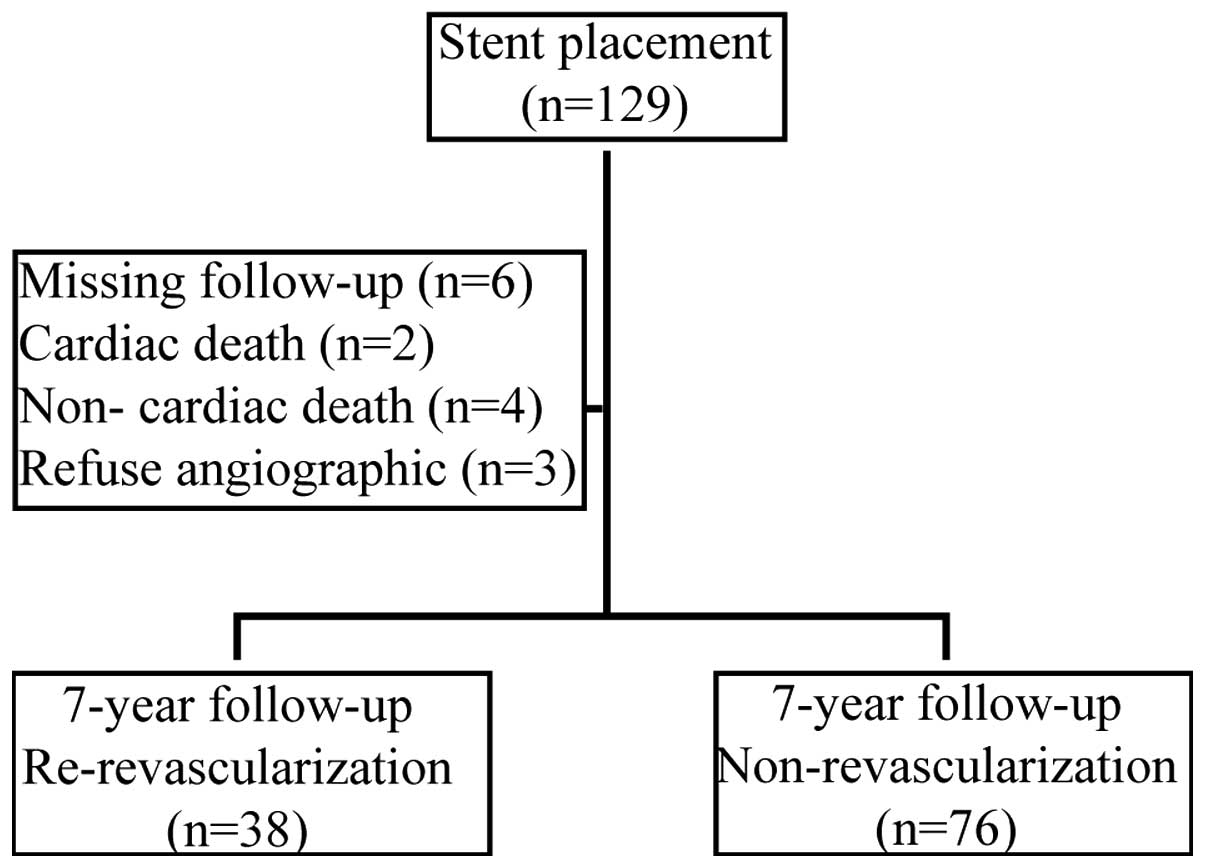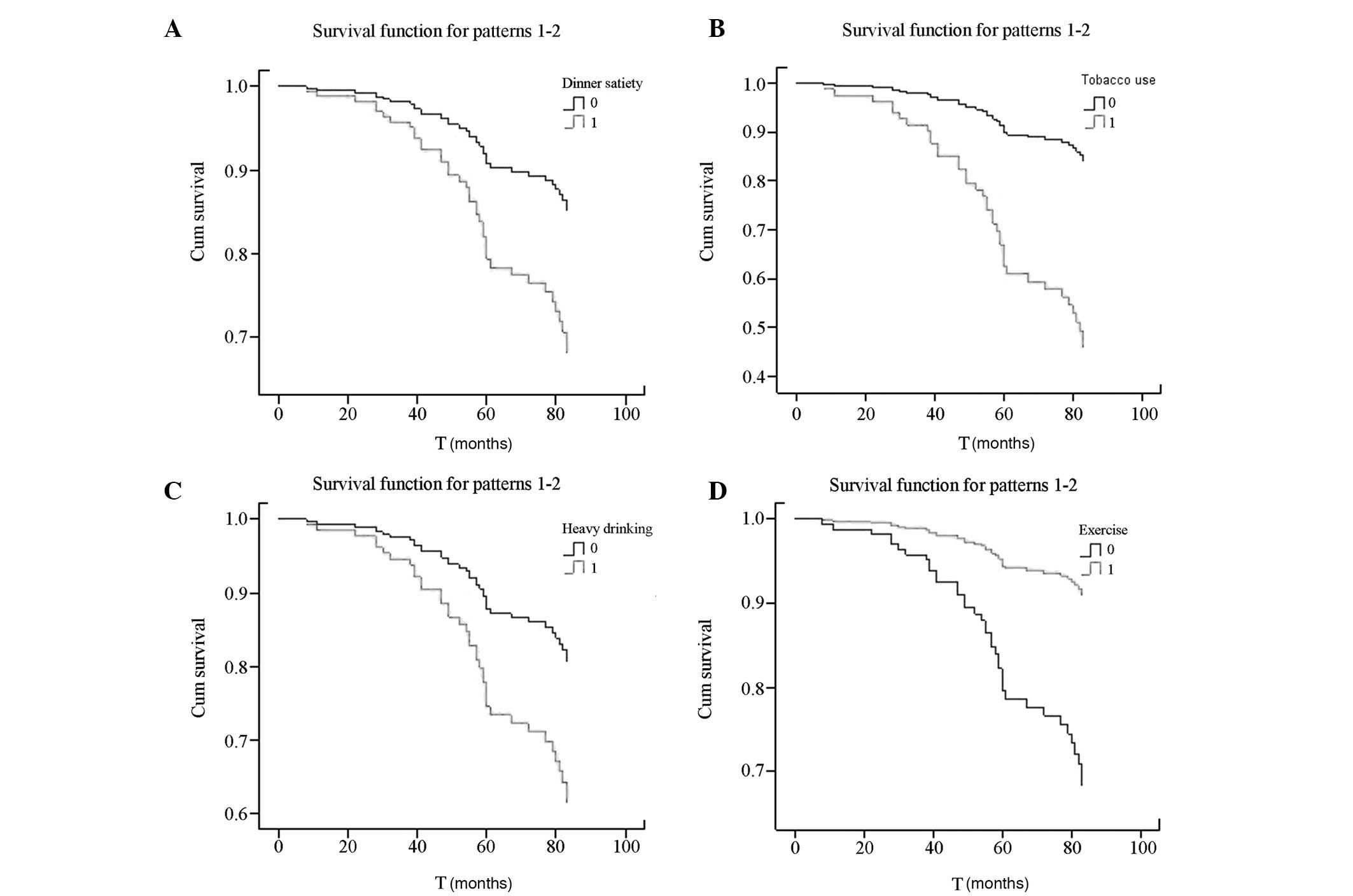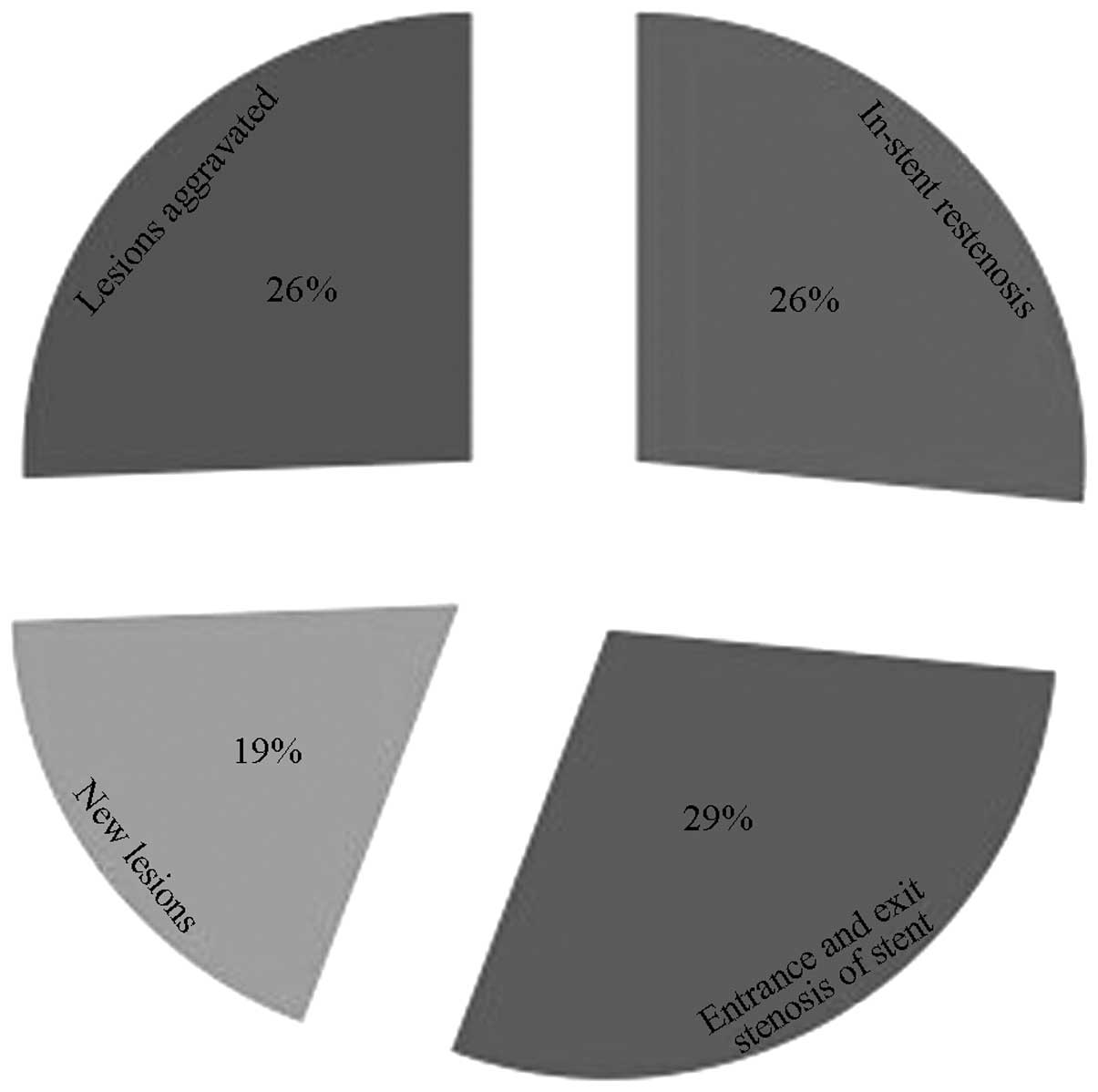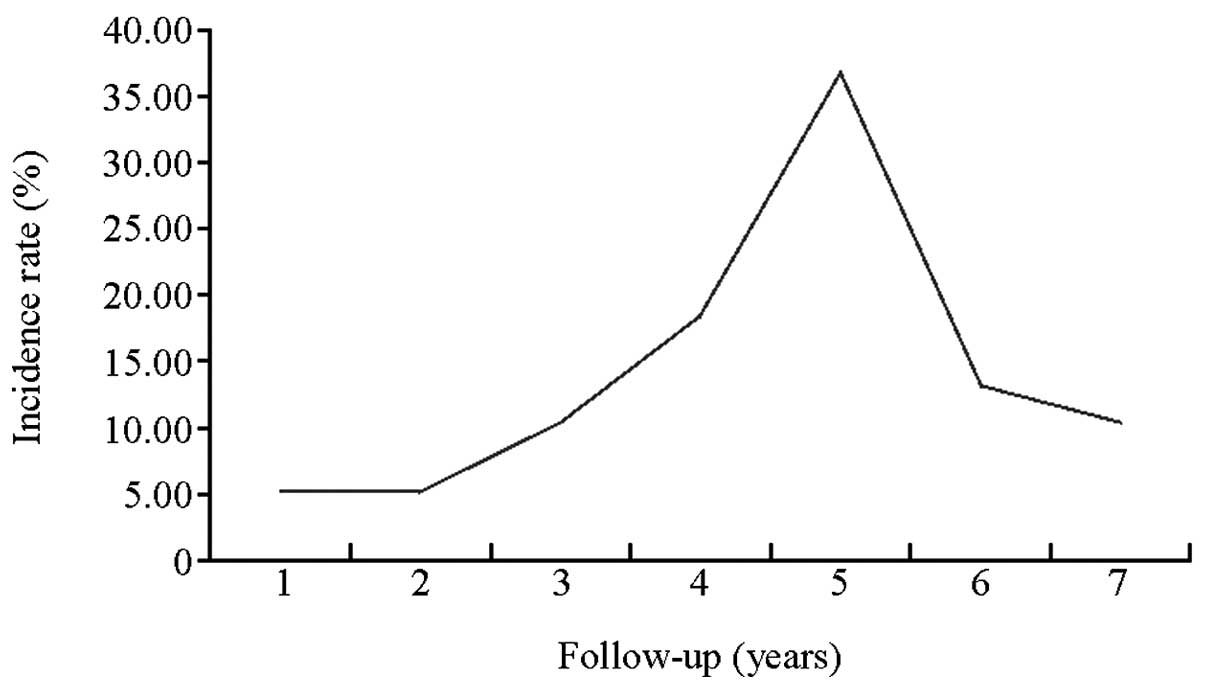|
1
|
He J, Gu D, Wu X, et al: Major causes of
death among men and women in China. N Engl J Med. 353:1124–1134.
2005. View Article : Google Scholar : PubMed/NCBI
|
|
2
|
Biondi Zoccai G, Abbate A, D'Ascenzo F, et
al: Percutaneous coronary intervention in nonagenarians: pros and
cons. J Geriatr Cardiol. 10:82–90. 2013.PubMed/NCBI
|
|
3
|
Bangalore S, Gupta N, Guo Y and Feit F:
Trend in the use of drug eluting stents in the United States:
insight from over 8.1 million coronary interventions. Int J
Cardiol. 175:108–119. 2014. View Article : Google Scholar : PubMed/NCBI
|
|
4
|
Giacoppo D, Baber U and Mehran R: Current
developments in dual antiplatelet therapy after stenting. Minerva
Cardioangiol. 62:261–276. 2014.PubMed/NCBI
|
|
5
|
Nöthlings U, Ford ES, Kröger J and Boeing
H: Lifestyle factors and mortality among adults with diabetes:
Findings from the European Prospective Investigation into Cancer
and Nutrition-Potsdam study. J Diabetes. 2:112–117. 2010.
View Article : Google Scholar : PubMed/NCBI
|
|
6
|
Hu FB, Liu Y and Willett WC: Preventing
chronic diseases by promoting healthy diet and lifestyle: public
policy implications for China. Obes Rev. 12:552–559. 2011.
View Article : Google Scholar : PubMed/NCBI
|
|
7
|
Reddy P, Rankins D, Timoshanko A and
Dunbar JA: Life! in Australia: translating prevention research into
a large-scale intervention. Br J Diabetes Vasc Dis. 11:193–197.
2011. View Article : Google Scholar
|
|
8
|
Krueger PM and Chang VW: Being poor and
coping with stress: health behaviors and the risk of death. Am J
Public Health. 98:889–896. 2008. View Article : Google Scholar : PubMed/NCBI
|
|
9
|
Menotti A, Puddu PE, Lanti M, Maiani G,
Catasta G and Fidanza AA: Lifestyle habits and mortality from all
and specific causes of death: 40-year follow-up in the Italian
Rural Areas of the Seven Countries Study. J Nutr Health Aging.
18:314–321. 2014. View Article : Google Scholar : PubMed/NCBI
|
|
10
|
Smith SC Jr, Dove JT, Jacobs AK, et al:
American College of Cardiology; American Heart Association Task
Force on Practice Guidelines. Committee to Revise the 1993
Guidelines for Percutaneous Transluminal Coronary Angioplasty:
ACC/AHA guidelines of percutaneous coronary interventions (revision
of the 1993 PTCA guidelines) - executive summary. A report of the
American College of Cardiology/American Heart Association Task
Force on Practice Guidelines (committee to revise the 1993
guidelines for percutaneous transluminal coronary angioplasty). J
Am Coll Cardiol. 37:2215–2239. 2001. View Article : Google Scholar : PubMed/NCBI
|
|
11
|
Hamilton M: A rating scale for depression.
J Neurol Neurosurg Psychiatry. 23:56–62. 1960. View Article : Google Scholar : PubMed/NCBI
|
|
12
|
Eisenstein EL, Anstrom KJ, Kong DF, et al:
Clopidogrel use and long-term clinical outcomes after drug-eluting
stent implantation. JAMA. 297:159–168. 2007. View Article : Google Scholar : PubMed/NCBI
|
|
13
|
Leproult R and Van Cauter E: Role of sleep
and sleep loss in hormonal release and metabolism. Endocr Dev.
17:11–21. 2010. View Article : Google Scholar : PubMed/NCBI
|
|
14
|
Copinschi G: Metabolic and endocrine
effects of sleep deprivation. Essent Psychopharmacol. 6:341–347.
2005.PubMed/NCBI
|
|
15
|
Lespérance F, Frasure-Smith N, Théroux P
and Irwin M: The association between major depression and levels of
soluble intercellular adhesion molecule 1, interleukin-6 and
C-reactive protein in patients with recent acute coronary
syndromes. Am J Psychiatry. 161:271–277. 2004. View Article : Google Scholar : PubMed/NCBI
|
|
16
|
Sherwood A, Hinderliter AL, Watkins LL,
Waugh RA and Blumenthal JA: Impaired endothelial function in
coronary heart disease patients with depressive symptomatology. J
Am Coll Cardiol. 46:656–659. 2005. View Article : Google Scholar : PubMed/NCBI
|
|
17
|
Pizzi C, Manzoli L, Mancini S and Costa
GM: Analysis of potential predictors of depression among coronary
heart disease risk factors including heart rate variability,
markers of inflammation and endothelial function. Eur Heart J.
29:1110–1117. 2008. View Article : Google Scholar : PubMed/NCBI
|
|
18
|
Lucassen EA, Zhao X, Rother KI, et al:
Sleep Extension Study Group: Evening chronotype is associated with
changes in eating behavior, more sleep apnea, and increased stress
hormones in short sleeping obese individuals. PLoS One.
8:e565192013. View Article : Google Scholar : PubMed/NCBI
|
|
19
|
Ku IA, Farzaneh-Far R, Vittinghoff E,
Zhang MH, Na B and Whooley MA: Association of low leptin with
cardiovascular events and mortality in patients with stable
coronary artery disease: the Heart and Soul Study. Atherosclerosis.
217:503–508. 2011. View Article : Google Scholar : PubMed/NCBI
|
|
20
|
Rajendran K, Devarajan N, Ganesan M and
Ragunathan M: Obesity, Inflammation and Acute Myocardial
Infarction-Expression of leptin, IL-6 and high sensitivity-CRP in
Chennai based population. Thromb J. 10:132012. View Article : Google Scholar : PubMed/NCBI
|
|
21
|
Knudson JD, Payne GA, Borbouse L and Tune
JD: Leptin and mechanisms of endothelial dysfunction and
cardiovascular disease. Curr Hypertens Rep. 10:434–439. 2008.
View Article : Google Scholar : PubMed/NCBI
|
|
22
|
Elbatarny HS and Maurice DH:
Leptin-mediated activation of human platelets: involvement of a
leptin receptor and phosphodiesterase 3A-containing cellular
signaling complex. Am J Physiol Endocrinol Metab. 289:E695–E702.
2005. View Article : Google Scholar : PubMed/NCBI
|
|
23
|
Hou X, Lu J, Weng J, et al: Chinese
National Diabetes and Metabolic Disorders Study Group: Impact of
waist circumference and body mass index on risk of cardiometabolic
disorder and cardiovascular disease in Chinese adults: a national
diabetes and metabolic disorders survey. PLoS One. 8:e573192013.
View Article : Google Scholar : PubMed/NCBI
|
|
24
|
Bays H and Dujovne C: Pharmacotherapy of
obesity: currently marketed and upcoming agents. Am J Cardiovasc
Drugs. 2:245–253. 2002. View Article : Google Scholar : PubMed/NCBI
|
|
25
|
Gu D, Kelly TN, Wu X, et al: Mortality
attributable to smoking in China. N Engl J Med. 360:150–159. 2009.
View Article : Google Scholar : PubMed/NCBI
|
|
26
|
Barua RS and Ambrose JA: Mechanisms of
coronary thrombosis in cigarette smoke exposure. Arterioscler
Thromb Vasc Biol. 33:1460–1467. 2013. View Article : Google Scholar : PubMed/NCBI
|
|
27
|
Bliden KP, Dichiara J, Lawal L, et al: The
association of cigarette smoking with enhanced platelet inhibition
by clopidogrel. J Am Coll Cardiol. 52:531–533. 2008. View Article : Google Scholar : PubMed/NCBI
|
|
28
|
Klatsky AL, Armstrong MA and Friedman GD:
Alcohol and mortality. Ann Intern Med. 117:646–654. 1992.
View Article : Google Scholar : PubMed/NCBI
|
|
29
|
Emberson JR, Shaper AG, Wannamethee SG,
Morris RW and Whincup PH: Alcohol intake in middle age and risk of
cardiovascular disease and mortality: accounting for intake
variation over time. Am J Epidemiol. 161:856–863. 2005. View Article : Google Scholar : PubMed/NCBI
|
|
30
|
Goldberg DM, Hahn SE and Parkes JG: Beyond
alcohol: beverage consumption and cardiovascular mortality. Clin
Chim Acta. 237:155–187. 1995. View Article : Google Scholar : PubMed/NCBI
|
|
31
|
Albert CM, Manson JE, Cook NR, Ajani UA,
Gaziano JM and Hennekens CH: Moderate alcohol consumption and the
risk of sudden cardiac death among US male physicians. Circulation.
100:944–950. 1999. View Article : Google Scholar : PubMed/NCBI
|
|
32
|
Guan Z, Lui CY, Morkin E and Bahl JJ:
Oxidative stress and apoptosis in cardiomyocyte induced by
high-dose alcohol. J Cardiovasc Pharmacol. 44:696–702. 2004.
View Article : Google Scholar : PubMed/NCBI
|
|
33
|
O'Keefe JH, Bybee KA and Lavie CJ: Alcohol
and cardiovascular health: the razor-sharp double-edged sword. J Am
Coll Cardiol. 50:1009–1014. 2007. View Article : Google Scholar : PubMed/NCBI
|
|
34
|
Luk TH, Dai YL, Siu CW, et al: Effect of
exercise training on vascular endothelial function in patients with
stable coronary artery disease: a randomized controlled trial. Eur
J Prev Cardiol. 19:830–839. 2012. View Article : Google Scholar : PubMed/NCBI
|
|
35
|
Hedbäck B, Perk J, Hörnblad M and Ohlsson
U: Cardiac rehabilitation after coronary artery bypass surgery:
10-year results on mortality, morbidity and readmissions to
hospital. J Cardiovasc Risk. 8:153–158. 2001. View Article : Google Scholar : PubMed/NCBI
|
|
36
|
Yu CM, Lau CP, Chau J, McGhee S, Kong SL,
Cheung BM and Li LS: A short course of cardiac rehabilitation
program is highly cost effective in improving long-term quality of
life in patients with recent myocardial infarction or percutaneous
coronary intervention. Arch Phys Med Rehabil. 85:1915–1922. 2004.
View Article : Google Scholar : PubMed/NCBI
|
|
37
|
Meng Khoo C and Tai ES: Trends in the
incidence and mortality of coronary heart disease in asian pacific
region: The Singapore experience. J Atheroscler Thromb. 21(Suppl
1): S2–S8. 2014. View Article : Google Scholar : PubMed/NCBI
|


















